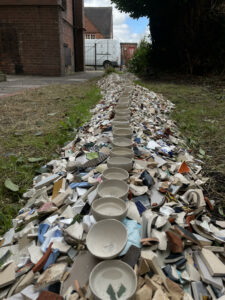Full of strange tiny coincidences, this thing we call life. Seldom of any real significance, but almost 6 months ago to the day was the last blog post I wrote; at that time the winter was finally giving way to spring with all of the anticipation that comes with that time of year. And now here we are with the cool, dark, creeping air releasing us from the obligation of making the most of every moment of the fleeting summer, ushering in a period of focus. The second year has begun and the pace is quick. Anyway enough romantic pre-amble, it’s not as if I have some arbitrary word count to meet but I do have something that I wanted to write about, for the first time in a long time sitting in this chair in the Clay College Gallery.

I had the pleasure of meeting Elspeth Owen, one of the award artists at this year’s British Ceramics Biennial at All Saints Church in Hanley, through a friend who was helping her with the install. Her piece, photoed here, is a reflection on a lifetime of creative output, questioning what to do with it all when we come to the end of our careers. I went to hear her give a talk yesterday and was really quite moved by her words. I had met Elspeth; but I had never met ‘Material Woman’, the woman that exists without economic or state recognition and all of the freedom that comes with it, that Elspeth is when she dons her patchwork coat made from the scraps of outfits once worn by her friends. We loose things all of the time. Some things we do not care to loose, in fact some things we are happy to (Elspeth included toenail clippings in that category). Somethings we break, whether by accident or on purpose. Glass shatters with the crashing sound of inevitability, but ceramics let out a particular whine as they break that affects us in a very particular way. The sound piercing our ear, demanding our attention, leaving the bitter taste of our own carelessness that perhaps gives rise to the inevitable keeping of the piece with the well-meaning though fallacious intention that one will spend time repairing the piece at some point. And so the shards sit in some shoe-box somewhere until they’re cry out to be fixed is no longer a cry but a muted murmur that we can allow ourselves to ignore.
Elspeth’s work began by calling out for shards, and a global response created the pile upon which her pots sit, slowly decaying after being fired to bisque and drinking from the sea. The thousands of hands involved in making the pots, and the stories of how they ended up breaking, all speak to one another in forming a tense and beautiful pathway leading you in to the church (well, actually slightly disappointingly, not because that gate isn’t how you get in to the church – a missed opportunity). I had one shard in the pile, which has a story of its own which I wanted to share here.
I came to know about a village where the echos of material processing ring though the air – water powered hammers fill up until the weight of the water raises the mighty arm before it empties and smashes down on the clay below. These knocks sound day and night like wind chimes in the still air. The town produces anonymous high-fired slip-decorated pottery of a near exclusively functional nature that I find quiet; beautiful. It wasn’t until years later I had the chance to visit, doing so in 2019, and had resolved myself to buy 6 plates and 6 cups. Posting them back they miraculously survived but for one of the cups. The plates remained in daily use, moved house twice in London and then to Stoke, before one met its end at the hands of a Staffordshire Oatcake. My greedy hands sliced though the soft oat-pancake with all the excitement of an animal presented with leftovers from the table instead of the usual dry biscuits, and I rocked the footed plate which then crashed backwards towards me like one of those mighty hammers in the town of its creation: but instead of the dull melodic thud the characteristic whine of the breaking pot cut though me. I was affected more than I though I would be, I have become quite used to losing my own ceramics but I had projected some sort of symbolic meaning on those plates and their place in the many decisions I had to make before resolving to come to Clay College. I kept them and deluded myself that I would fix it at some point, but it was, to borrow Elspeth’s own words, beyond repair. Now the shards sit anonymous in the great pile of broken ware that form the foundation for Elspeth’s newly created pots. A shard from a plate that meant something to me, from the series of plates that just weeks before we all dined from after Elspeth had finished the installation, together with my good friend and extremely talented potter Rachel Kurdynowska (to whom I am very grateful for brining us all together) and my partner.
Anyway, it has started raining and I have spoken too much. You can find out about the programme of the BCB here
And concurrently the community festival Stoke on Clay is running, with events and exhibitions around the city, including at Clay College with a special demo by the Director of the College Kevin Millward on October 14th
Callum

